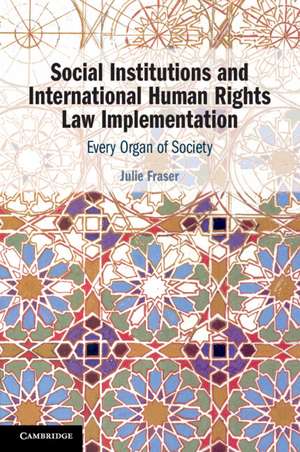Social Institutions and International Human Rights Law Implementation: Every Organ of Society
Autor Julie Fraseren Limba Engleză Paperback – 5 ian 2021
| Toate formatele și edițiile | Preț | Express |
|---|---|---|
| Paperback (1) | 287.87 lei 6-8 săpt. | |
| Cambridge University Press – 5 ian 2021 | 287.87 lei 6-8 săpt. | |
| Hardback (1) | 728.37 lei 6-8 săpt. | |
| Cambridge University Press – 5 aug 2020 | 728.37 lei 6-8 săpt. |
Preț: 287.87 lei
Nou
Puncte Express: 432
Preț estimativ în valută:
55.08€ • 57.52$ • 45.49£
55.08€ • 57.52$ • 45.49£
Carte tipărită la comandă
Livrare economică 15-29 aprilie
Preluare comenzi: 021 569.72.76
Specificații
ISBN-13: 9781108747387
ISBN-10: 1108747388
Pagini: 338
Dimensiuni: 152 x 229 x 18 mm
Greutate: 0.45 kg
Editura: Cambridge University Press
Colecția Cambridge University Press
Locul publicării:Cambridge, United Kingdom
ISBN-10: 1108747388
Pagini: 338
Dimensiuni: 152 x 229 x 18 mm
Greutate: 0.45 kg
Editura: Cambridge University Press
Colecția Cambridge University Press
Locul publicării:Cambridge, United Kingdom
Cuprins
1. Introduction: the challenge of human rights implementation; 2. Human rights and its cultural connection; 3. Domestic implementation of international human rights treaties: legislative and other effective measures; 4. Domestic implementation of international human rights treaties: the role of public and private actors; 5. Role of Islamic Law and institutions in implementing women's right to family planning in Indonesia; 6. Conclusions: social institutions and the future of domestic human rights implementation; Select bibliography; Index.
Recenzii
'Julie Fraser's Social Institutions and International Human Rights Law Implementation makes the compelling case for the importance of connecting human rights to local communities in the search for more effective and enduring forms of human rights implementation. Through both a powerful case study of the symbiotic relationship between Islamic institutions and Indonesia's family planning programmes, and insightful critical engagement with human rights history and theory, her book is a must-read for any scholar or practitioner looking for ways to expand the toolkit beyond arid legalism or rigid state-centricity.' Mark Goodale, University of Lausanne, Series Editor of Stanford Studies in Human Rights
'In an era of human rights contestation, it is becoming increasingly clear that a sustainable human rights project cannot rely on states alone. Indeed, 'every organ of society' has a role to play for the realisation of human rights. Julie Fraser's book is the first to study in depth what this means, both in legal terms and concretely, on the ground.' Eva Brems, Senior Full Professor, Head of the Human Rights Centre, Ghent University
'In Social Institutions and International Human Rights Law Implementation, Dr Fraser brings a rare and insightful mind to the crisis, vitality and hope in the human rights project. This book pulsates with a unique kaleidoscope of high theory, praxis and discourse that lays bare both the torment and redeeming power of human rights. In it, Professor Fraser reaches into the annals of global cultures to weave a story of the liberatory potential of the norms, processes and institutions steeped in the human rights corpus. Most remarkably, she puts forth a broad school of thought that hears the critiques of the Global South and the incompleteness of the human rights text. It's a great work of reference.' Makau Mutua, SUNY Distinguished Professor, SUNY Buffalo Law School, The State University of New York
'In an era of human rights contestation, it is becoming increasingly clear that a sustainable human rights project cannot rely on states alone. Indeed, 'every organ of society' has a role to play for the realisation of human rights. Julie Fraser's book is the first to study in depth what this means, both in legal terms and concretely, on the ground.' Eva Brems, Senior Full Professor, Head of the Human Rights Centre, Ghent University
'In Social Institutions and International Human Rights Law Implementation, Dr Fraser brings a rare and insightful mind to the crisis, vitality and hope in the human rights project. This book pulsates with a unique kaleidoscope of high theory, praxis and discourse that lays bare both the torment and redeeming power of human rights. In it, Professor Fraser reaches into the annals of global cultures to weave a story of the liberatory potential of the norms, processes and institutions steeped in the human rights corpus. Most remarkably, she puts forth a broad school of thought that hears the critiques of the Global South and the incompleteness of the human rights text. It's a great work of reference.' Makau Mutua, SUNY Distinguished Professor, SUNY Buffalo Law School, The State University of New York
Notă biografică
Descriere
Critiquing the State-centric and legalistic approach to implementing human rights, this book illustrates the efficacy of relying upon social institutions.
